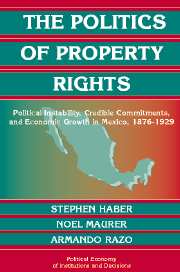 The Politics of Property Rights
The Politics of Property Rights Published online by Cambridge University Press: 02 December 2009
No sector of the Mexican economy was as immune to political instability as petroleum. In fact, crude oil production increased every single year from 1910 to 1921. By the time the upward rally in output began to reverse in the early 1920s, Mexico was the world's second most important producer (behind the United States), controlling 25 percent of world output. Even with the decline in output from its 1921 peak, oil output for the decade 1921–30 was more than 2 times what it had been during the decade 1911–20, and more than 87 times what it had been in the decade 1901–10.
This feat of production was remarkable because it took place under two major threats to property rights. First, petroleum, like other industries with high sunk costs, was particularly vulnerable to predation. The very nature of the industry rested on the ability of asset holders to claim and enforce a politically created property right, specifically the rights to wealth in the subsoil. Governments could abrogate those rights, allocate them to a third party, tax the rents they produced, or diminish them by permitting offset drilling on an adjoining property. Second, the oil industry was a ready source of revenue for revolutionary factions. Large infusions of cash were needed – and were needed badly. Moreover, the oil companies were an ideal target for predation. They could easily be taxed, because it was easy to monitor the value and volume of production.
To save this book to your Kindle, first ensure [email protected] is added to your Approved Personal Document E-mail List under your Personal Document Settings on the Manage Your Content and Devices page of your Amazon account. Then enter the ‘name’ part of your Kindle email address below. Find out more about saving to your Kindle.
Note you can select to save to either the @free.kindle.com or @kindle.com variations. ‘@free.kindle.com’ emails are free but can only be saved to your device when it is connected to wi-fi. ‘@kindle.com’ emails can be delivered even when you are not connected to wi-fi, but note that service fees apply.
Find out more about the Kindle Personal Document Service.
To save content items to your account, please confirm that you agree to abide by our usage policies. If this is the first time you use this feature, you will be asked to authorise Cambridge Core to connect with your account. Find out more about saving content to Dropbox.
To save content items to your account, please confirm that you agree to abide by our usage policies. If this is the first time you use this feature, you will be asked to authorise Cambridge Core to connect with your account. Find out more about saving content to Google Drive.